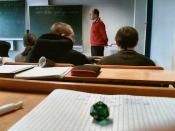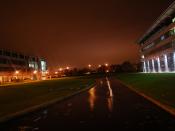Chase Byrd
8:00
Exam
Aristotle believed in a universal goal for all things. That meant chance and random selection doesn't exist in nature. Since nature was what the first philosophers turned to, Aristotle looked there for some answers. Nature has unconscious purposes. There are mistakes in nature though, he points out. He believed in change and cause of change, and since nature has so much order it must have a cause. Aristotle was very rational and tried to be logically precise so he turned to science for the answers. He believed that a particular has substance, which causes form. Forms must have change and the study of change involves the investigator of forms in the changing objects of the world of becoming. He believes in natural change and forms must have movement or change. He found that change takes place between opposites and there must always be a material factor between the two.
A material change is one in which the substance of the change was caused by change. Be was a strong believer in matter and rejects the idea of any space as a void because empty space is impossible. Space is defined as the limit of one body towards what is surrounding it. Aristotle saw the ultimate reality in physical objects and he knew this threw experience. Objects are composed of potential and reality. Potential being matter and reality being form. A block of wood has the potential to become whatever form a sculptor gives it. A seed has the potential to grow into a plant and an egg has the potential to turn into a human.
Sextus Empiricus was a historian of ancient skepticism, especially the teachings of Pyrrhonism. Skepticism does not affirm or deny that knowledge is possible. But skepticism shows that every proposition has...


